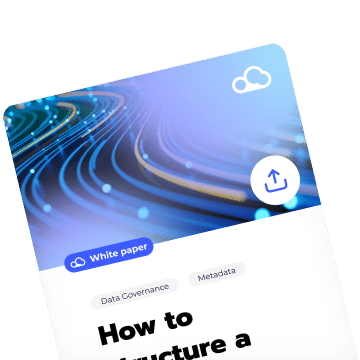
The Data Engineer’s role in data governance
With much focus on data analysis and insights, it can be easy to overlook the infrastructure that supports it. Yet, without a well-structured infrastructure, data lacks a functional foundation. Focused on creating and maintaining architectures, Data Engineers also support data modeling, warehousing, and transformation: essentially, they work with everything necessary to ensure that data is ready for analysis.
This blog post will discuss the roles and responsibilities, interchange with data governance, and the criticality of the Data Engineer role.
Understanding the Data Engineer’s role in data governance
Data Engineers manage the entire data lifecycle including collection, storage, processing, and delivery. Their primary focus is building and maintaining the underlying infrastructure supporting data-driven decision-making. Typically, Data Engineers play several leading roles, including:
- Data architecture visionary: Data Engineers are responsible for designing, building, and maintaining the overall data architecture.
- Data operations manager: Data Engineers manage the architecture’s data operations, including data pipelines. They optimize data processing, query performance, and data quality while troubleshooting issues to keep data flowing.
- Data transformation specialist: Data Engineers transform raw data into datasets used for analysis. They use data modeling, data governance, and data quality to craft data solutions to meet the needs of a diverse group of users.
- Data security and privacy champion: Data Engineers ensure that sensitive data assets remain protected and that regulatory compliance is upheld. They implement robust security measures, monitor data access, and develop governance policies that maintain ethical standards and safeguard data privacy.
- Cross-functional collaborator: Data Engineers partner with data scientists, analysts, IT professionals, and business leaders to understand their data requirements and deliver customized data solutions that support the needs of the business.
Bridging the gap: Data engineering & governance
Data engineering and data governance have a strategic alliance that brings several benefits to organizations:
- Upholding data quality and consistency: Data quality is the foundation for sound analysis. While data governance seeks to achieve this consistency, data engineering builds these strategies into the infrastructure. Together, they create and maintain high-quality data through validation, cleansing, and standardization.
- Secure and compliant data integration: Data engineering integrates data from diverse sources to enable analysis. Data governance safeguards data’s journey by executing rules for data access, security, and privacy. This collaboration ensures that it all happens within a secure and regulatory-compliant framework.
- The role of metadata in governance and engineering: Metadata is the data about data. While governance outlines standards for metadata management, Data Engineers have the technological know-how to capture, store, and employ metadata to support governance initiatives.
To further amplify the synergy, organizations should consider the following:
- Foster cross-functional teams: Data engineering and governance experts should collaborate to support a shared vision, goals, and strategy. Regular dialogs, shared learning platforms, and coordinated documentation promote a cohesive environment for effective data management.
- Unify data standards: Create mutually agreed upon data definitions and standards to improve data management. These definitions help to promote data literacy among all data users in an organization.
- Automate quality assurance: Embed data quality assessments within engineering processes to support standardized data. This automation creates consistent and easy-to-use quality data for end users.
- Integrate governance within engineering: Integrating data governance principles into every stage of data engineering assures that governance is proactively applied. Good governance occurs at every step of the data’s lifecycle and not when it is tacked on to the end of processing.
The partnership between data engineering and governance is strategic and foundational. Organizations seeking to derive maximum value from their data must promote this type of seamless collaboration between these critical elements of data management.
Case study: Collaboration in action – Illinois Department of Transportation
At the Illinois Department of Transportation (IDOT), Data Engineers are the craftsmen of their highways – that is, their information highways. They face a formidable task: Designing complex systems and integrating a vast amount of safety data. These systems, like the Geographic Information System (GIS), become the backbone of IDOT’s analytical capabilities, bringing together various data points into a coherent, actionable framework.
Yet, as Data Engineers sculpt these systems, they don’t work in isolation. The data governance teams are their constant allies in this quest for data coherence to ensure the data flowing into these systems is protected and purposeful.
The collaboration is evident in how they approach the challenges. When Data Engineers devise a new Linear Referencing System (LRS), Data Governance is right there, outlining policies that ensure the quality and security of data ingested. The governance team evaluates the data’s precision while engineers ensure it integrates seamlessly.
Take, for instance, the Illinois Traffic Records Coordinating Committee (ITRCC) efforts. While the committee envisions strategies, the engineers translate them into technical solutions. And as engineers innovate, governance safeguards the integrity of their creations by setting standards and benchmarks.
Distinct contributions by Data Engineers at IDOT
- Technical design and integration: Data Engineers were pivotal in designing complex data systems, ensuring that different data points seamlessly meshed within platforms like GIS.
- Linear Referencing System creation: When envisioning a new LRS, it was the engineers who translated this vision into a functional, efficient system, facilitating data inputs from multiple sources.
- Technical solutions for ITRCC strategies: The engineers translated the strategic visions of the Illinois Traffic Records Coordinating Committee (ITRCC) into tangible technical solutions, optimizing system performances.
Distinct contributions by Data Governance at IDOT
- Data quality and security: While engineers crafted the systems, data governance teams laid out policies to ensure that data flowing into these systems was of the highest quality. They set rigorous standards to determine the data’s accuracy, completeness, and timeliness.
- Regulatory compliance: Data governance made sure that all systems, especially the newly devised LRS, adhered to state and federal regulations, ensuring that IDOT’s data infrastructures met legal and ethical benchmarks.
- Setting standards for data integrity: As Data Engineers brought innovations to the table, the governance teams ensured the integrity of these innovations by establishing rigorous standards and benchmarks. They also played a role in monitoring and ensuring adherence to these standards.
Collaboration is the lifeblood of IDOT’s initiatives. Engineers provide the tools, and governance ensures they’re used effectively and responsibly. Together, they ensure that IDOT’s data isn’t just vast, accurate, secure, and insightful.
The synergy between Data Engineers and data governance at IDOT is a testament to the significance of collaboration in the digital age. By weaving together technical expertise and governance foresight, IDOT stands at the forefront of transportation innovation and serves as a blueprint for other organizations.
Emerging trends in the Data Engineer’s role
The landscape of data engineering continues to evolve. As we peer into the future, several possible fundamental shifts stand out:
- Specialization within the discipline: The broad domain of data engineering is shifting toward specialization. As designs become even more complex, specialized roles such as analytics engineers, cloud data engineers, and machine learning engineers may emerge. This diversification highlights the depth and breadth of expertise required in modern data-centric environments.
- Empowering data consumers: The surging trend towards automation and self-service platforms is streamlining data processes. As a result, data engineers may find that guiding data analysts and other data consumers to help them navigate these self-service platforms becomes a more significant part of their role.
- Guardians of data governance: With increasing scrutiny on data privacy and ethical usage, the emphasis on data governance and compliance has never been greater. As custodians of data infrastructure, engineers will be at the forefront, embedding robust security measures, ensuring regulatory compliance, and promoting a culture of data responsibility.
- Embracing the cloud: No longer a luxury, the cloud has become a necessity. Cloud-native data engineering practices will become the norm. This shift will demand that Data Engineers thoroughly understand cloud architectures and best practices.
The essence of a Data Engineer’s role is moving beyond technical prowess and toward adaptability. Staying up-to-date with trends, continuously upskilling, and cultivating a collaborative and proactive approach will be the hallmarks of success in this evolving domain.
In light of these trends, the role of Data Engineers is poised for evolution. As technologies shift the landscape of data management and analysis, Data Engineers will adapt in terms of skills and strategic influence. They will become central figures in shaping how businesses leverage data for competitive advantage in the future.
Harnessing the power of Data Engineers for data governance
The role of a Data Engineer in today’s data-driven landscape is multi-dimensional. Their collaboration with data governance is not just an added benefit but an essential foundation for any successful data initiative. This partnership ensures the steady flow of data and its responsible, ethical, and compliant usage. By interweaving the expertise of data engineering with the principles of governance, organizations stand to gain maximum value from their data assets.
Conclusion
While technological advancements and industry demands will cause Data Engineers to evolve, their alliance with data governance remains a central theme. Data Engineers’ best practices will expand beyond technical skills. Embracing simplicity, prioritizing documentation, and ensuring data quality will be paramount. The future of data engineering suggests a move towards specialization, providing even more significant opportunities for these professionals.
Yet, amidst all the evolutions and trends, one core message remains evident: As data becomes the cornerstone of decision-making, innovation, and strategy, the collaboration between data engineering and governance will be the linchpin for success in this ever-changing domain.
U.S. Department of Transportation, Federal Highway Administration. "Roadway Safety Data Program." Federal Highway Administration, 2016, https://safety.fhwa.dot.gov/rsdp/downloads/fhwasa16108.pdf.
____________________
Discover the benefits of creating an intuitive data catalog to fit your needs! Sign up for a demo of DataGalaxy’s Data Knowledge Catalog, an all-in-one tool that offers out-of-the-box actionability with fully customizable attributes, powerful visualization tools, standardized business glossaries, and AI integration to help organizations easily document, link, and track all their metadata assets on one dynamic platform.




